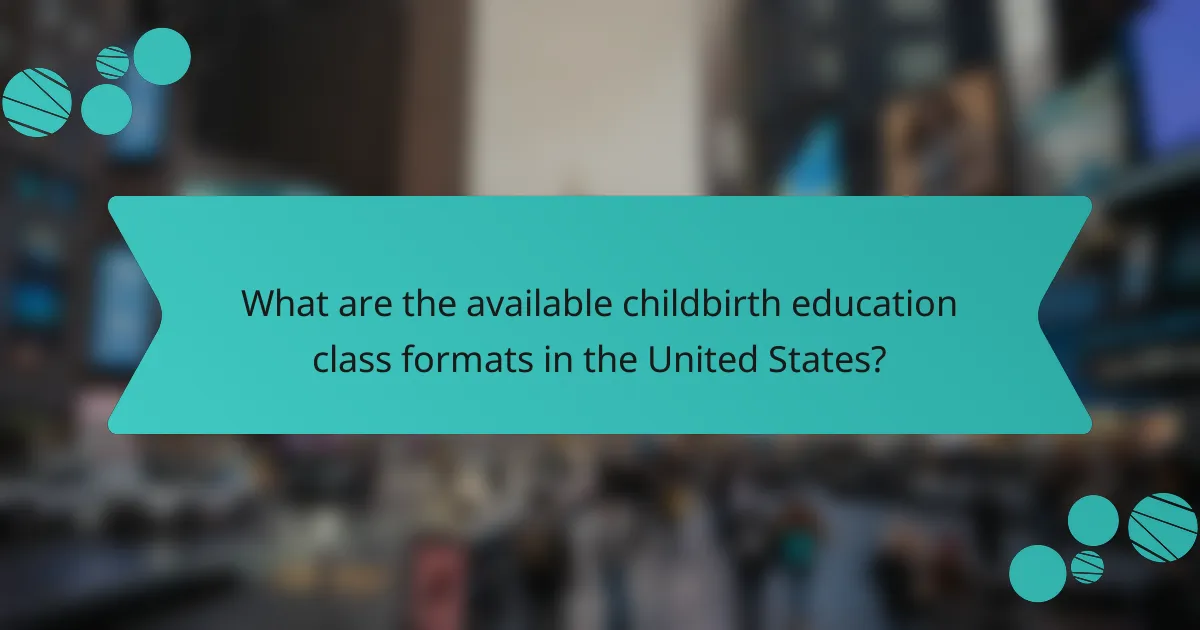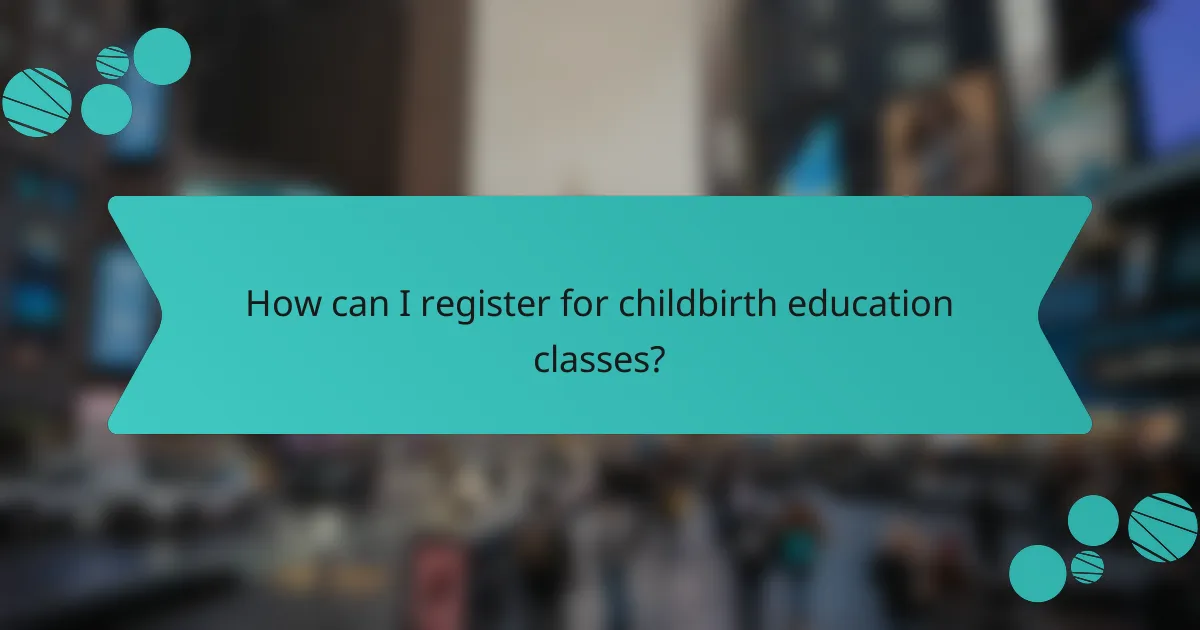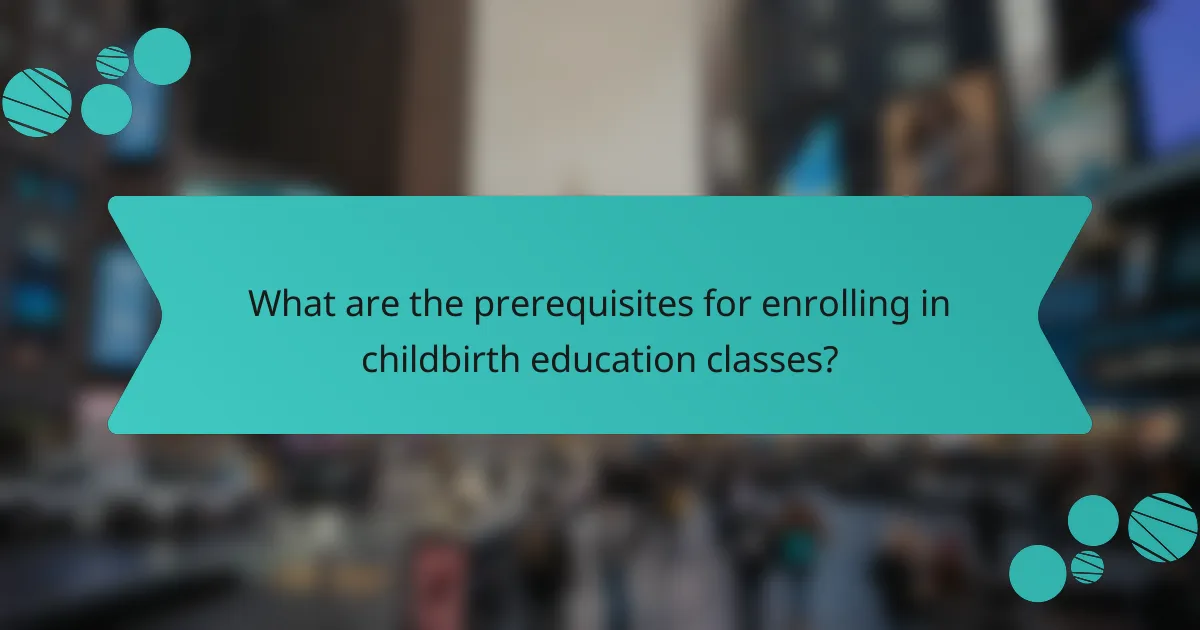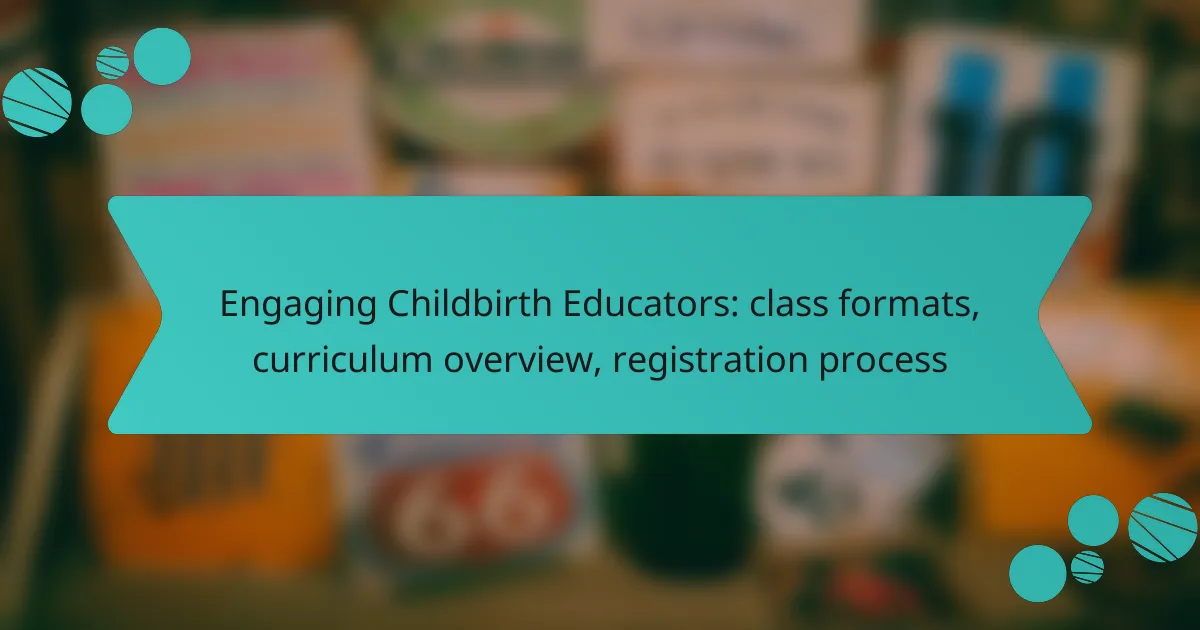Childbirth education classes in the United States are designed to cater to diverse learning styles and schedules, offering formats such as in-person sessions, online courses, and hybrid options. These classes cover vital topics to prepare expectant parents for labor, delivery, and early parenting, including pain management and newborn care. Registration can be completed through various methods, allowing you to choose the option that best fits your needs.

What are the available childbirth education class formats in the United States?
In the United States, childbirth education classes are offered in various formats to accommodate different learning preferences and schedules. These include in-person classes, online courses, hybrid options, private sessions, and group workshops, each providing unique benefits and considerations.
In-person classes
In-person classes involve face-to-face instruction, typically held at hospitals, community centers, or private studios. These classes allow for direct interaction with instructors and other expectant parents, fostering a supportive environment.
Participants can engage in hands-on activities, practice breathing techniques, and ask questions in real-time. It’s advisable to check local offerings as class sizes and schedules can vary widely across regions.
Online classes
Online classes provide flexibility, allowing expectant parents to learn at their own pace from the comfort of home. These courses often include video lectures, interactive quizzes, and downloadable resources.
While online formats may lack personal interaction, many platforms offer discussion forums or live Q&A sessions to enhance engagement. Look for accredited programs to ensure quality content and support.
Hybrid classes
Hybrid classes combine both in-person and online elements, offering a balanced approach to childbirth education. Participants may attend some sessions in person while completing others online, providing flexibility and personal interaction.
This format is ideal for those who want the benefits of both worlds, allowing for hands-on practice while accommodating busy schedules. Check with local providers for specific hybrid offerings and schedules.
Private sessions
Private sessions offer personalized instruction tailored to the specific needs of the expectant parent or couple. These one-on-one classes can be scheduled at convenient times and locations.
Private sessions are beneficial for those seeking focused attention or specific topics, such as pain management techniques or birth plans. However, they may come at a higher cost compared to group classes.
Group workshops
Group workshops typically involve a larger number of participants and focus on specific topics related to childbirth, such as breastfeeding or newborn care. These workshops encourage sharing experiences and building community among expectant parents.
While they may not provide as much individual attention, group settings can foster a sense of camaraderie and support. Consider joining workshops that align with your interests and schedule for a more enriching experience.

What topics are covered in childbirth education curricula?
Childbirth education curricula typically cover essential topics that prepare expectant parents for labor, delivery, and early parenting. These subjects include labor and delivery processes, pain management techniques, breastfeeding basics, postpartum care, and newborn care.
Labor and delivery processes
Understanding labor and delivery processes is crucial for expectant parents. Classes often explain the stages of labor, signs of labor onset, and the role of healthcare providers during delivery. Parents learn about different birth settings, including hospitals, birthing centers, and home births.
Participants are encouraged to discuss their birth plans, which can include preferences for interventions, support persons, and pain relief options. This preparation helps reduce anxiety and fosters a sense of control during the birthing experience.
Pain management techniques
Pain management techniques are a key focus in childbirth education. Expectant parents explore various methods, including breathing exercises, relaxation techniques, and the use of medications such as epidurals or nitrous oxide. Understanding these options allows parents to make informed choices about pain relief during labor.
Classes may also cover non-pharmacological methods, such as hydrotherapy, massage, and acupressure. Parents are encouraged to practice these techniques in advance to find what works best for them.
Breastfeeding basics
Breastfeeding basics are essential for new parents, as they provide foundational knowledge for successful nursing. Classes typically cover the benefits of breastfeeding, proper latching techniques, and how to recognize hunger cues in newborns. Parents learn about common challenges, such as sore nipples and engorgement, and how to overcome them.
Additionally, discussions may include pumping, storing breast milk, and the importance of skin-to-skin contact. This knowledge helps parents feel more confident in their ability to nourish their baby.
Postpartum care
Postpartum care is a vital aspect of childbirth education that focuses on the mother’s recovery after delivery. Topics include physical healing, emotional well-being, and the importance of support systems. Parents learn about common postpartum issues, such as baby blues and postpartum depression, and when to seek help.
Classes may also address self-care strategies, including rest, nutrition, and exercise. Understanding postpartum care helps parents prepare for the transition to parenthood and promotes overall health.
Newborn care
Newborn care education equips parents with the skills needed to care for their infant in the early days. Topics include diapering, bathing, and establishing a feeding routine. Parents learn about safe sleep practices, such as placing babies on their backs to sleep and avoiding soft bedding.
Classes often emphasize the importance of regular pediatric check-ups and vaccinations. This knowledge helps parents feel more prepared and confident in their ability to care for their newborn.

How can I register for childbirth education classes?
You can register for childbirth education classes through various methods, including online, by phone, or in person. Each option has its own advantages, so consider what works best for your schedule and preferences.
Online registration through websites
Many childbirth education programs offer online registration through their official websites. This method is often the most convenient, allowing you to browse available classes, compare schedules, and complete your registration at any time.
When registering online, ensure that you have all necessary information ready, such as your contact details and payment method. Look for secure payment options and confirm your registration via email to avoid any issues.
Phone registration with local educators
Phone registration is another straightforward option for enrolling in childbirth education classes. By calling local educators, you can ask questions about class content, schedules, and fees directly.
During the call, be prepared to provide your personal information and payment details. This method allows for immediate clarification of any concerns you may have, ensuring you choose the right class for your needs.
In-person registration at community centers
In-person registration is available at many community centers that offer childbirth education classes. This approach allows you to meet instructors and get a feel for the environment before committing.
When registering in person, check the center’s hours and bring any required documentation, such as identification or proof of residency. This option can also provide opportunities to network with other expectant parents.

What are the prerequisites for enrolling in childbirth education classes?
To enroll in childbirth education classes, participants typically need to meet certain prerequisites that may vary by provider. Common requirements include being an expecting parent, meeting age guidelines, and considering any relevant health factors.
Expecting parent status
Most childbirth education classes are designed specifically for expecting parents, including those who are pregnant or planning to become pregnant. Some classes may also welcome partners or support persons, allowing them to learn together about the childbirth process and parenting skills.
It is essential to check with the specific class provider to confirm if there are any additional requirements regarding who can attend, as some programs may focus on specific demographics or situations, such as first-time parents or those expecting multiples.
Age requirements
Age requirements for enrolling in childbirth education classes can vary. Generally, participants should be at least 18 years old, especially if they are attending without a guardian. However, some classes may accept younger attendees if accompanied by a parent or guardian.
It’s advisable to verify the age policies of the class you are interested in, as some programs may have specific age limits or recommendations based on the content being taught.
Health considerations
Health considerations are an important factor when enrolling in childbirth education classes. Expecting parents should ideally be in good health, but many classes accommodate various health conditions. It is recommended to consult with a healthcare provider before attending, especially if there are any complications or concerns regarding the pregnancy.
Some classes may offer specialized sessions for individuals with specific health needs, such as those with high-risk pregnancies or certain medical conditions. Always check with the class provider to see if they can cater to your health situation effectively.

What are the benefits of attending childbirth education classes?
Attending childbirth education classes offers numerous advantages, including better preparation for labor and delivery, as well as increased confidence for both parents. These classes equip expectant parents with essential knowledge and skills to navigate the childbirth experience more effectively.
Improved birth preparedness
Childbirth education classes enhance birth preparedness by providing comprehensive information about the labor process, pain management options, and potential interventions. Participants learn about the stages of labor, signs of labor onset, and when to go to the hospital or birthing center.
Classes often include practical exercises, such as breathing techniques and relaxation strategies, which help parents feel more in control during labor. Expectant parents should consider attending classes that align with their birth plan, whether they prefer a natural approach or plan to use medical interventions.
Enhanced partner involvement
Childbirth education classes foster enhanced partner involvement by encouraging active participation in the birthing process. Partners learn how to support the birthing parent through comfort measures, emotional support, and effective communication with healthcare providers.
Classes often emphasize the importance of teamwork during labor, helping partners understand their role and how they can contribute positively. This collaborative approach can strengthen the bond between partners and create a more supportive environment for the birthing experience.
